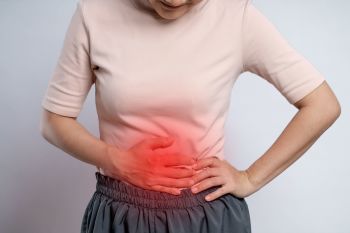THE CONNECTION BETWEEN IBS, EATING DISORDERS AND THE LOW-FODMAP DIET by Oana Oancea
Posted on
 Nearly 50% of individuals with Functional gastrointestinal disorders (FGIDs) have been shown to have disordered eating or a full-blown eating disorder (ED), and some 90%+ of those individuals with a diagnosed ED also have one or more FGID.1
Nearly 50% of individuals with Functional gastrointestinal disorders (FGIDs) have been shown to have disordered eating or a full-blown eating disorder (ED), and some 90%+ of those individuals with a diagnosed ED also have one or more FGID.1
Irritable bowel syndrome (IBS) is an FGID characterised by abdominal pain, bloating and disturbed defaecation. Anorexia nervosa (AN), binge eating disorders, and other eating disorders all have the potential of affecting our GI system.2
The relationship between gastrointestinal symptoms and EDs is complex. In fact, several of the earliest medical descriptions of AN in the 19th century highlighted that the sufferers' reasons for self-starvation typically were inappetence (lack of appetite), feelings of fullness and abdominal pain or constipation.3
Patients often implement self-driven dietary restrictions to control their symptoms.
Appropriate dietary restriction is not associated with harmful consequences. However, restrictive practices can progress and place individuals at risk of the development of disordered eating patterns. These patterns can lead to pathologies such as weight loss, inadequate nutrition and significant psychosocial impairment.4
Most of the current data highlight the prevalence of IBS among patients with eating disorders. Studies have shown that over 90% of patients with anorexia or bulimia have functional GI symptoms.1
An eating disorder can complicate the clinical picture of a patient with IBS. There is concern about over medicalising patients and not recognising the role of disordered eating or an eating disorder vs over attributing the patient’s GI symptoms to the psychological process. Awareness is key!
As part of therapy for a variety of gastroenterology disorders, including IBS, patients are often appropriately prescribed restrictive or elimination diets. However, clinicians need to be cautious when prescribing restrictive diets to patients who have an eating disorder or history or evidence of restrictive dietary practices.
 LOW-FODMAPS
LOW-FODMAPS
Due to the restrictive nature of a low-FODMAP diet, recommending this to certain patients can do more harm than good to gut diversity, food tolerance and food fears. It is not appropriate for those with eating disorders or for those who are at risk of developing an eating disorder due to the risk of triggering disordered eating habits.
A study on the low-FODMAP diet among IBS patients found that 23% were at risk of eating disorder behaviours, and they also demonstrated significantly greater adherence to the low-FODMAP die. These findings highlight the complex link that exists between eating disorders and IBS.5
TIPS FOR REDUCING FOOD STRESS AND SOOTHING YOUR GUT
1. Self-care
Hot water bottle or a heat pad for pain and cramping; mint or ginger tea for nausea or upset tummy; magnesium for constipation; fibre for diarrhoea.
2. Overcome the stress
Stress causes the brain to release cortisol and other hormones, which all act on the gut, contributing to IBS symptoms. Being in a constant state of stress about food or weight gain can trigger digestive issues. Meditation, yoga and regular physical activity can help reduce overall and gut-specific stress. It may be beneficial to use stress-relieving techniques to destress before meals, such as short-guided meditations, deep breathing exercises, journaling, or eating with others. Mindfulness has also been shown to reduce gut symptoms.
3. Don’t over restrict
The elimination phase is not intended to be utilised long term to treat IBS. The ‘gentle low-FODMAP’ diet may be useful for people experiencing disordered eating.
 4. Eat regularly
4. Eat regularly
Either a meal or a snack every three to four hours, aligning with the gut’s rhythms and establishing consistent eating patterns over time. This will help diminish IBS symptoms related to disordered eating patterns.If we skip meals or eat too frequently, this disrupts the gut’s normal rhythm and can lead to abnormal motility (diarrhoea, constipation, bloating, etc).
Restriction can cause the muscles in the digestive tract to atrophy, or weaken, leading to constipation, bloating due to trapped stomach gasses, gastroparesis, or delayed stomach emptying. Eating limited food variety can disrupt the microflora of the gut. The diet should be focused on consistency and balance. Nourishing your gut with regular, adequate, balanced and varied meals.
5. Take time to eat and properly chew and digest the food
6. Understand that many ‘filler foods’ and low-calorie foods are gut irritants. For example:
- Chewing too much gum can result in bloating.
- Drinking too much coffee as an appetite suppressant can have a laxative effect.
- A high intake of sweeteners can irritate the gut and trigger symptoms like bloating and diarrhoea.
- Excessive fibre intake from eating too much fruit and vegetables can also cause extreme gas and bloating.
Other factors to consider:
- Developing good toilet habits
- Monitoring fluid intake
- Getting enough sleep
- Reevaluating the relationship with exercise to include more gentle movement
LOW FODMAP DIET AND EATING DISORDERS: WHAT TO CONSIDER
- The risk of remaining stuck following this restrictive diet for months or years out of fear of reintroducing trigger foods again.
- Increased anxiety around some foods/social settings and potential to further restrict diet.
- It can be used to mask disordered eating.
- Risk of obsessive thinking about food.
- Creates a negative relationship with food and develops disordered eating behaviours.
- Risk of nutritional deficiencies due to existing food restrictions(vegans, vegetarians).
CONCLUSION
Minimising eating disorder behaviours is necessary to avoid further complications that may result from IBS.
A better understanding of the potential harms of prescribing restrictive dietary therapies is recommended, as well as how to effectively risk-stratify patients when prescribing restrictive diets.
Oana Oancea, RD
Oana is an Eating Disorder Dietitian and is currently on maternity leave.
She previously worked with Day Centre patients and outpatients in Dumfries.
In the past, she led the CAMHS Addiction and Eating Disorde
Unit in Priory Hospital, Chelmsford.
References:
- Harer KN. Irritable Bowel Syndrome, Disordered Eating, and Eating Disorders. Gastroenterol Hepatol (N Y). 2019 May;15(5):280-282. PMID: 31360143; PMCID: PMC6589841
- Riehl M, Scarlata K. Understanding Disordered Eating Risks in Patients with Gastrointestinal Conditions. J Acad Nutr Diet. 2021. doi:10.1016/j.jand.2021.03.001
- Sato Y and Fukudo S (2015). Gastrointestinal symptoms and disorders in patients with eating disorders. Clinical journal of gastroenterology [online] 8(5):255-63. Available at: https://doi.org/10.1007/s12328-015-0611-x [Accessed 10 January 2023]
- Boyd C, Abraham S, Kellow J. Psychological features are important predictors of functional gastrointestinal disorders in patients with eating disorders. Sc and J Gastroenterol 2005;40:929-935
- Marsh A, Eslick EM and Eslick GD (2016). Does a diet low in FODMAPs reduce symptoms associated with functional gastrointestinal disorders? A comprehensive systematic review and meta-analysis. European Journal of Nutrition. [online] 55:897-906. Available at: https://doi.org/10.1007/s00394-015-0922-1 [Accessed 11 January 2023]
